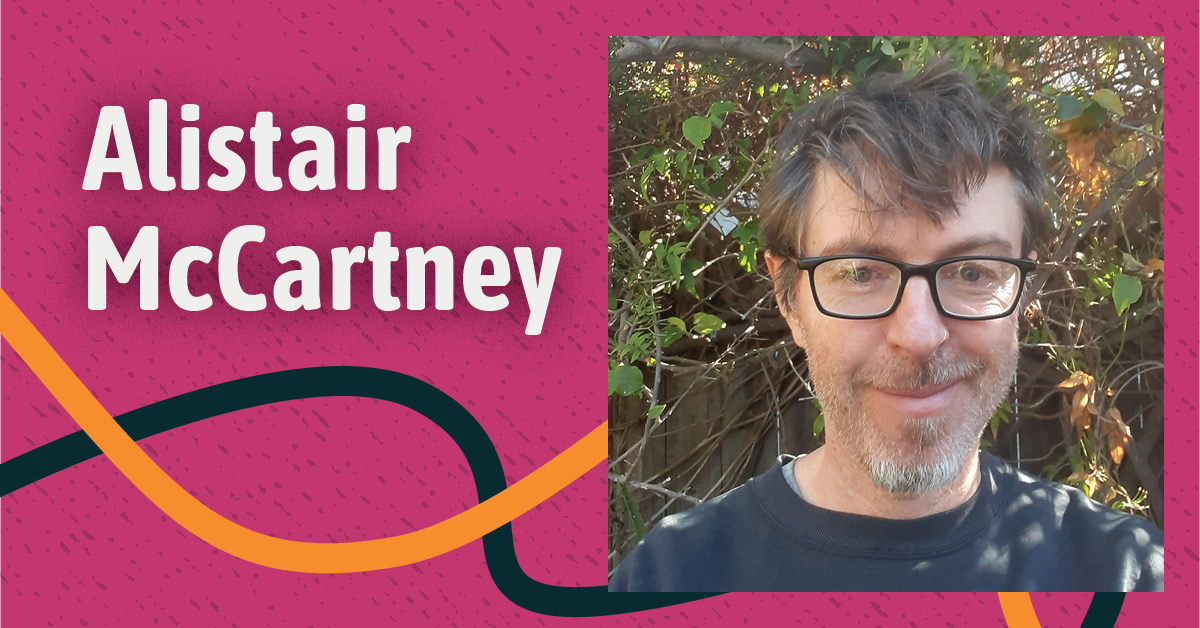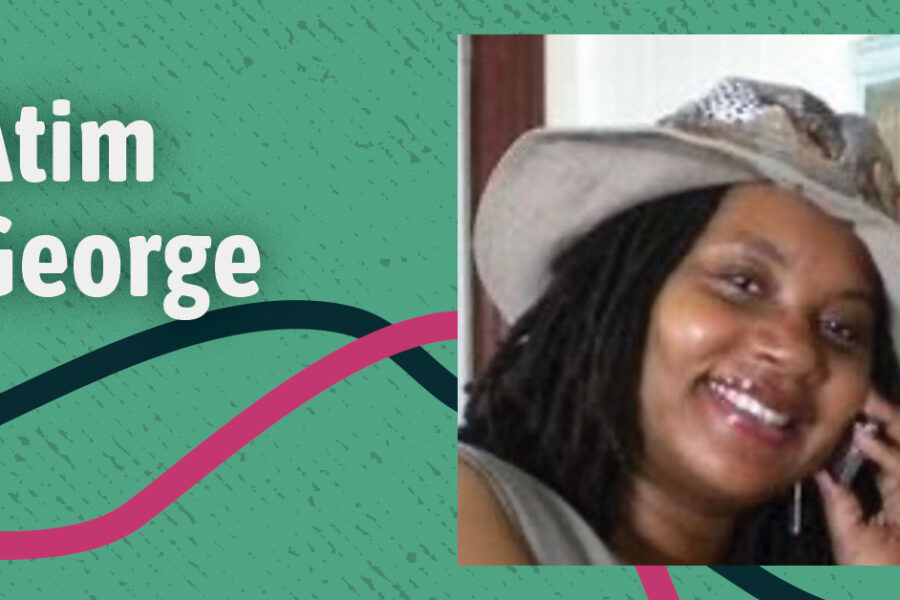When a person’s student visa expires in the United States, finding a job becomes imperative. This was certainly true for the accomplished author Alistair McCartney, who is an alum of the Master of Fine Arts in Creative Writing at Antioch Los Angeles and today serves as Teaching Faculty in both the MFA and that campus’s undergraduate programs. When he began studying in the MFA program in 1997, McCartney, who is originally from Perth, a remote city on the west coast of Australia, had no idea that he would end up permanently living in Los Angeles, let alone that he would spend a big part of his life as a teacher at Antioch. But work at Antioch—and McCartney’s enduring relationship with his now-husband, the performance artist Tim Miller—has kept him here on the west coast of North America for a quarter-century now. And his journey at Antioch, from student to teacher, has always been organic, with one opportunity seamlessly leading to the next, for two decades and counting.
McCartney hasn’t had to rely on work to provide him with a visa for almost a decade now. In 2013, he married Tim Miller, in New York, when the Supreme Court struck down the so-called Defense of Marriage Act. This ruling required the federal government to legally recognize same-sex marriages—and to extend to same-sex married people the many rights that accompany marriage, including citizenship for foreign-born spouses. After years of government-imposed discrimination, McCartney was able to obtain his green card through marriage and finally begin his path to citizenship.
But even with his immigration status cleared up, McCartney has continued on at Antioch. For 25 years now, Antioch has provided more than a balance between McCartney’s creative work and teaching—the two have always had a harmonious relationship.
Since being accepted into the MFA program’s very first cohort but having to defer and return to Australia to sort out his student visa such that he began his studies as part of the Orange cohort in December 1997, McCartney has published two novels as well as placing many poems, short stories, and essays in literary magazines. Soon after graduating from the MFA, he began tutoring, then teaching in the Undergraduate Studies Program at Antioch, and he was brought on as Affiliate Faculty in the Master of Fine Arts in Creative Writing in 2008. McCartney has continued teaching in both over the years since, and recently he was hired into a new role as Teaching Faculty in both programs. His new role will continue to build on a long history of community, creativity, and support in the Antioch MFA program.
This enthusiastic engagement with his work carries into his own writing. “When I’m teaching I’m always learning about my own process,” McCartney says. “It really keeps me in my own writing, and adding this new job—it intrinsically connects me back to my work.”
McCartney’s latest novel, The Disintegrations, comprises a series of meditations that are narrated by a character who shares many traits with McCartney, the novel’s author. Some of these fictional essays take place in Holy Cross Cemetery, which is just across from Antioch’s Los Angeles campus—and where McCartney himself likes to take walks. The novel, with its experimental form and rootedness on the sun-bleached streets of Los Angeles, embodies much of Alistair’s particular story: his affection for his adopted city, the persistent sense of cultural distance that typifies the experience of immigration, and the experimental nature of his writing, which he has nurtured as both a student and now a teacher at Antioch. More than even a job and a visa, it’s clear that McCartney has found in Los Angeles a home, a career, and a creative calling.
Building Foundations as an Antioch Student
When McCartney began his MFA, he was enrolled as a creative nonfiction student. His first workshop was taught by Bernard Cooper, a novelist and essayist who often writes in an autobriographical mode, exploring his own life as a gay man. As he sat in the classroom, critiquing his classmates’ work and having his own critiqued, all under the guidance of Cooper, he realized that this was the first formal workshop he had ever been in. He had always written, but now he was in this newly-founded MFA, where everything was new for him—but also where he thrived.
He began working with Jim Krusoe, who became an instrumental figure in his development as a writer. “I learned things from him about editing and recentering how I look at my work,” McCartney recalls. “Things that were really essential for me, as a writer, and as a teacher.” As he progressed through the program, McCartney shifted his focus to studying the writing of fiction, but he’s always been interested in blurring the boundaries between the two genres.
Another influential figure from McCartney’s student days was the feminist Chicana writer Cherríe Moraga, who gave a powerful seminar on art and anger. During the lecture, Moraga had everyone sit in a circle and complete a writing exercise where they responded to the prompt, “I was not supposed to remember ____.” Everyone had to fill in that blank—a powerful inducement to writing the uncomfortable and even the unspeakable.
Moraga also introduced McCartney to the craft book Three Steps on the Ladder of Writing by Hélène Cixous. This work became a critical tool for McCartney in his teaching. He especially loved Cixous’s concept of the “inaugural scene.” He still uses this concept in his teaching both in the MFA and undergraduate programs. Ultimately, McCartney’s studies greatly influenced who he would be both as a writer and as a teacher of creative writing in his own right.
Staying in Community as an Educator
Since McCartney was in the U.S. on a student visa during his MFA, continuing his involvement with Antioch was crucial to staying in the country. Fortunately, the university offered him one opportunity after the next. As a student, he had a work study position in the Community Humanities Education program,which eventually became the Bridge Program, as well as in program offices around the university.
Then Andrea Richards, who was teaching as core faculty in undergraduate studies, offered him a position as a writing tutor in the Teaching and Learning Center. In 2002, David Tripp, another UGS Core Faculty Member, asked McCartney to teach a class on writing and resistance in the Bachelor of Arts in Liberal Studies program. This morphed into a teaching position at UGS. And in 2008, after his first novel was published—a project McCartney began during his MFA—Steve Heller, former chair of the program, asked him to teach a genre workshop. This is another position that grew, leading McCartney to become a mentor in the program he started as a student in.
Creating and Sustaining a Literary Uprising
By 2013 McCartney was an affiliate faculty member in both the MFA and the undergraduate programs, where he served as director of the creative writing concentration. It was at this time that he began curating Antioch’s Literary Uprising Reading Series. Almost ten year later, the role remains one of the most enjoyable aspects of his work at the university.
When he started, the reading series was relatively small, mostly featuring current Antioch students and faculty. But over the course of the last decade McCartney has expanded the event. He now includes as many writers from the greater Los Angeles literary community as possible. In recent years, he’s invited MFA alumni and faculty with new books out. This has been a powerful way to support literary citizenship through partnership. Literary Uprising has featured fiction students from Jim Krusoe’s Santa Monica College workshop, students from the UCLA extension school’s writing program, PEN America Emerging Voices fellows, and writers from MFA mentor Terry Wolverton’s Writers at Work group. The Literary Uprising series provides writers from Antioch and greater Los Angeles a place to share their work and, in a broader sense, opportunities to find literary community.
Another part of McCartney’s teaching practice is to continue advocating for his students after they graduate, much as his own teachers did for him years earlier. “What’s especially wonderful about Alistair is his commitment to helping students expand their creative writing universe,” says the co-chair of the Division of Undergraduate Studies, MeHee Hyun. “It’s not just about getting them into a class, but he really mentors students to get engaged in all aspects of the creative process.”
Hyun is proud to have such an excellent and devoted teacher in the undergraduate studies programs, but her admiration for McCartney goes even deeper. “That he’s a brilliant writer and lovely human just makes us even more fortunate,” she says, “to have his talents as part of our faculty.”
Philosophy and Personal Practices
In his teaching statement on Antioch’s website McCartney references the famous line from Franz Kafka, “A book must be an axe for the frozen sea inside us.” To access that sea, McCartney suggests patience, persistence, and cultivating a daily writing practice. It’s advice that McCartney—who is currently working on two books amidst his many roles at Antioch—shares with students and adheres to in his own creative life.
Whenever a student or friend feels disconnected from a project, he recommends sitting with the work—to try shifting the center, to uncover anything that may at first be hidden. It’s a compelling piece of guidance, and unquestionably reminiscent of what he learned from his mentor Jim Krusoe during his MFA.
Another strategy is to read out loud. “Our own voices often sound strange to us,” McCartney says, referencing the existentialist notion of an authentic self. It follows that, as a writer, getting stuck often has to do with perception more than anything else. Sometimes the solution is to disconnect and just let the work be itself. McCartney works to help his students have this more intuitive and insight-driven relationship with their writing, just as he cultivates it for himself.
Bringing Cultivated Insight to a New Role
The mysteries of writing are a subject that McCartney has much experience with, but he’s also diving into a new area of expertise: the challenge of helping run a graduate creative writing program. That’s what he’s now working on in his new role as Teaching Faculty in the MFA. McCartney is joining the team of Interim Program Chair Lisa Locascio Nighthawk, Core Faculty Victoria Chang, dramatic writing Program Faculty Colette Freedman, the program coordinators Daisy Salas and Natalie Truhan, and program assistants Dasha Sidenko and Jessica Calderon in running the MFA.
In his new role, McCartney is most excited to interact with more MFA students outside of the fiction genre, both on a practical and human level. “Writing is often a struggle in different ways for all of us,” he says. As a writer and alum he recognizes that students’ needs have shifted over these last few complicated years, and he is well-positioned to help them navigate that.
“As an alum of the Antioch MFA and one of our longest-serving mentors, Alistair has special insight into Antioch students’ needs and experiences,” says Locascio Nighthawk. But she’s also enthusiastic to bring McCartney’s special writing insight into the running of the program. She says that “Alistair has a special ability to communicate the magic of creative writing.”
In addition to connecting with students, McCartney is excited to help achieve an ongoing push to make the MFA more inclusive, prestigious, and helpful to its students. Having seen the program develop and change over the last quarter-century, McCartney admires the evolution the MFA has experienced over the last five years since Victoria Chang and then Lisa Locascio Nighthawk were brought into the program. He says, “It’s such a great energy right now, amongst faculty and students. And our guests bring such excitement to our residences.”
Given McCartney’s long and dedicated history at Antioch, there’s no doubt his excitement, brilliance, and enthusiasm will weave its way into every inch of the program’s fabric. As Locascio explains, “He has already proven to be an indispensable part of the MFA Team, and we are so delighted to have our work enriched by his expertise and wisdom.”



